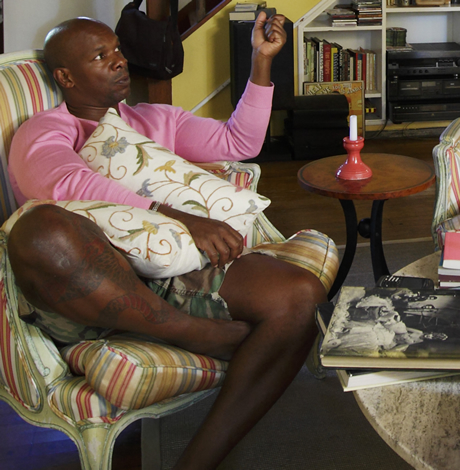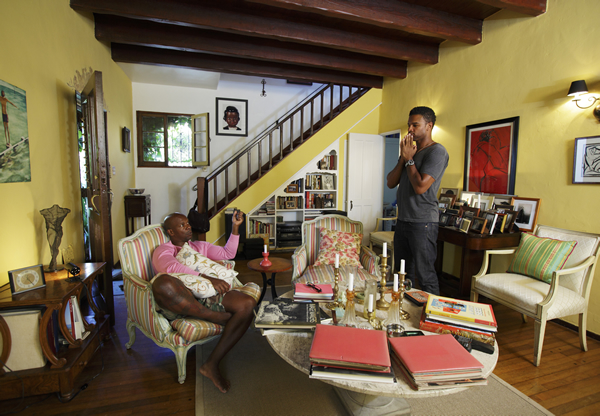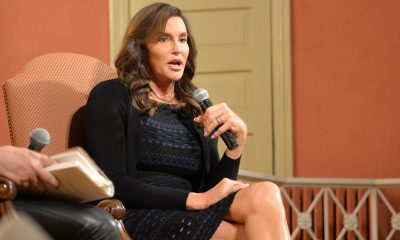Books
SPRING ARTS 2017: Books — Gays at home
New Atwood photography book one of many LGBT-themed spring tomes


Doug Spearman, left, and Marc Samuel at their home. The photo is from ‘Tom Atwood: Kings & Queens in Their Castles,’ a new coffeetable book that shows LGBT people in their homes. (Photo used with permission from Atwood)
Does a 15-year project of photographing 350 LGBT subjects sound overly ambitious? Not for Tom Atwood, who has done just that with his breathtaking photo series, “Tom Atwood: Kings & Queens In Their Castles” (Damiani, March 28). Atwood’s monumental project, which has been named the most comprehensive LGBT photo series ever conducted in the U.S., portrays the intimate moments of prominent figures ranging from Don Lemon to Alison Bechdel.
If you’re a poetry fan, “New American Best Friend” by Olivia Gatwood (Button Poetry, March 28), is a stunning celebration of contemporary womanhood, gender and sexuality by one of the most venerated young poets and queer writers in America. Gatwood effortlessly segues between themes of pleasure, violence, youth and adulthood, and ultimately transitions into a fearless ode to women and the messy journey faced in finding oneself.
If you’re crafty and creative, “Queer Threads: Crafting Identity and Community” by John Chaich and Todd Oldham (AMMO Books, April 1), is a delightful compilation of crochet, embroidery, quilting and sewing masterpieces by an international mix of 30 LGBT artists. To elaborate on how queerness has influenced their fiber and textile work, the artists are interviewed by renowned leaders in creative fields — many gay themselves.
As we still grieve his sudden passing, “George Michael: the Life: 1963-2016” by Emily Herbert (Lesser Gods, April 4), will provide closure on the life and legacy of one of Pop’s most beloved and unapologetically gay icons. Herbert thoughtfully touches on George Michael’s early life, rise to fame, sex scandals, struggle with depression and addiction, and mysterious death, ultimately revealing that his legacy is as rooted in (often anonymous) charity as it is in music.
In “The Secrets of My Life” by Caitlyn Jenner (Grand Central Publishing, April 25), readers can dive much deeper into the remarkable story of the most famous transgender woman in the world, told in her own words. Jenner recounts intensely personal stories of her struggle to find self-acceptance in the context of being an Olympic legend and global symbol of masculinity, as well as the patriarch of the ubiquitous Kardashian family.
In “No One Can Pronounce My Name: A Novel” (Picador, May 2), Lambda Literary Award-winning author Rakesh Satyal tells the multigenerational story of a community of Indian Americans living in a Cleveland suburb. Harit, a lonely Indian immigrant in his 40s, finds himself dressing in a sari every night to pass off as his deceased sister for his grieving mother. He later befriends Ranjana, who writes paranormal stories to find escape during her husband’s suspected infidelity. Their unlikely friendship is a hilarious and touching account of navigating American society and the divide between Eastern and Western cultures.
After a generous profile in the New Yorker last year, “Nature Poem” by Tommy Pico (Tin House Books, May 9), is definitely one of this year’s most anticipated LGBT releases. In a book-length poem, Pico tells the story of Teebs, a young, queer, American-Indian poet who prefers city life and struggles to write about nature, the subject white people and wider American culture equate him with. Pico himself identifies as queer and grew up on the Viejas Reservation near San Diego, so “Nature Poem” is very much a meditation on his own life in Brooklyn and his American-Indian identity.
No matter your age, “It’s Not Like It’s A Secret” by Misa Sugiura (HarperTeen, May 9), is a young adult fiction novel about two girls of color falling in love that will touch even the least-high school nostalgic of readers. In this poignant coming-of-age story, 16-year old Sana moves to California, where she meets the beautiful and intelligent Jamie Ramirez. Jamie spurs Sana to finally spill some of her many secrets, the hardest to admit being that she wants to be more than friends with Jamie.
For more poetry, “How To Get Over” by T’ai Freedom Ford (Red Hen Press, May 9), is a spellbinding debut that fearlessly confronts the author’s past hardships, including those related to sexual identity, sexual assault and substance abuse. Ford grapples with themes of homophobia, bullying, anti-black racism and gentrification, incorporating important reminders of slavery’s legacy as well as directly addressing modern-day pop culture icons like Kanye West and Nicki Minaj.
“The Voice Book for Trans and Non-Binary People: A Practical Guide to Creating and Sustaining Authentic Voice and Communication” by Matthew Mills and Gillie Stoneham (Jessica Kingsley Publishers, May 18) is a comprehensive guide for trans and non-binary individuals interested in achieving a different voice that feels more authentic to their identities. Written by two language and specialist speech therapists, this book provides a thorough overview of the process to develop new vocal skills, and includes exercises on resonance, intonation and pitch.
In her much-anticipated second memoir, “Surpassing Certainty: What My Twenties Taught Me” (Atria Books, June 13), Janet Mock details the existential growing pains she faced during her early 20s, many of which will feel relatable to readers despite her status as one of the most revered transgender rights and racial justice activists of her generation. “Surpassing Uncertainty” candidly unfolds with Mock’s uncomfortable failures and incremental successes in love and intimacy, career development and learning to advocate for herself as a transgender woman of color before advocating for her wider community.
This year, we’re blessed with not one but two memoirs written by bisexual writer Roxane Gay. In “Hunger: A Memoir of (My) Body” (Harper, June 13), the much-buzzed-about author explores her struggles with food, weight and body image with restorative vulnerability and honesty. Through her own journey, Gay provides invaluable lessons on self-care and self-love.
Other releases of note include:
• “Marilyn in Manhattan: Her Year of Joy” by Elizabeth Winder (Flatiron Books) is a beautiful love letter to one of the most celebrated icons of all time, specifically profiling her time in the Big Apple from 1954-1955: a year of independence, success and relief for Monroe. The book is $27.99 and releases March 14. The author will present the book at East City Bookshop (645 Pennsylvania Ave., SE) on Wednesday, March 15 at 7:30 p.m.
• “The Rules Do Not Apply: A Memoir” by Ariel Levy (Random House) is a sardonic reflection on the famed New Yorker writer’s life, telling the story of her traumatic loss of her unborn child in Mongolia through her signature queer feminist lens. The memoir is $16 and releases March 14.
• “The Tree of Healing of Love Love & Missed Opportunity” by Rev. Steven R. Fleming is an allegorical and evocative journey through seven symbolic gates that takes readers from pain and anger to acceptance and new possibilities via colorful, lyrical prose. It’s out now. Details at healingtreeoflostlove.com.
• “The War on Sex” (March, Duke University Press) explores the history of sex offender registries, criminalization of HIV and laws against sex work in a series of essays edited by David M. Halperin and Trevor Hoppe.
• “The Lotterys Plus One” (March 28, Levine) is the latest from lesbian bestselling author Emma Donoghue, her “middle-grade debut” (i.e. for grade school readers), which tells of family life when a grandfather with dementia comes to live with a family with young children.
• “The Spartacus International Gay Guide 2017” (Bruno Gmuender) is a must-have for gay and bisexual men who love to travel abroad. This year’s edition ($24.99) is out April 1, just in time for summer travel planning.
• “Making My Pitch: A Woman’s Baseball Odyssey,” by Ila Jane Borders and Jean Hastings Ardell (University of Nebraska Press), is the autobiography of Ila Jane Borders, the first woman to play men’s professional baseball in the modern era and, at the time, was a closeted gay athlete. It is $26.95 and is out April 1.
• “When I Grow Up I Want to Be a List of Further Possibilities,” by Chen Chen (BOA Editions Ltd.), is the author’s debut collection of poems that investigate love, family and identity from queer, Asian-American and immigrant perspectives. It’s $16 ($9.99 e-book) and releases April 11.
• “LGBT: San Francisco: the Daniel Nicoletta Photographs” (Reel Art Press) is an arresting compilation of the legendary photographer’s images of gay 1970s San Francisco, which include iconic photographs of Harvey Milk. The book is $60 and releases May 23.
Books
Two new books on dining out LGBTQ-style
Visit nightclubs, hamburger joints, and a bathhouse that feeds customers

‘What is Queer Food? How We Served a Revolution’
By John Birdsall
c.2025, W.W. Norton
$29.99/304 pages
‘Dining Out: First Dates, Defiant Nights, and Last Call Disco Fries at America’s Gay Restaurants’
By Erik Piepenburg
c.2025, Grand Central
$30/352 pages
You thought a long time about who sits where.
Compatibility is key for a good dinner party, so place cards were the first consideration; you have at least one left-hander on your guest list, and you figured his comfort into your seating chart. You want the conversation to flow, which is music to your ears. And you did a good job but, as you’ll see with these two great books on dining LGBTQ-style, it’s sometimes not who sits where, but whose recipes were used.
When you first pick up “What is Queer Food?” by John Birdsall, you might miss the subtitle: “How We Served a Revolution.” It’s that second part that’s important.

Starting with a basic gay and lesbian history of America, Birdsall shows how influential and (in)famous 20th century queer folk set aside the cruelty and discrimination they received, in order to live their lives. They couldn’t speak about those things, he says, but they “sat down together” and they ate.
That suggested “a queer common purpose,” says Birdsall. “This is how who we are, dahling, This is how we feed our own. This is how we stay alive.”
Readers who love to cook, bake or entertain, collect cookbooks, or use a fork will want this book. Its stories are nicely served, they’re addicting, and they may send you in search of cookbooks you didn’t know existed.
Sometimes, though, you don’t want to be stuck in the kitchen, you want someone else to bring the grub. “Dining Out” by Erik Piepenburg is an often-nostalgic, lively look at LGBTQ-friendly places to grab a meal – both now and in the past.

In his introduction, Piepenburg admits that he’s a journalist, “not a historian or an academic,” which colors this book, but not negatively. Indeed, his journeys to “gay restaurants” – even his generous and wide-ranging definitions of the term – happily influence how he presents his narrative about eateries and other establishments that have fed protesters, nourished budding romances, and offered audacious inclusion.
Here, there are modern tales of drag lunches and lesbian-friendly automats that offered “cheap food” nearly a century ago. You’ll visit nightclubs, hamburger joints, and a bathhouse that feeds customers on holidays. Stepping back, you’ll read about AIDS activism at gay-friendly establishments, and mostly gay neighborhood watering holes. Go underground at a basement bar; keep tripping and meet proprietors, managers, customers and performers. Then take a peek into the future, as Piepenburg sees it.
The locales profiled in “Dining Out” may surprise you because of where they can be found; some of the hot-spots practically beg for a road trip.
After reading this book, you’ll feel welcome at any of them.
If these books don’t shed enough light on queer food, then head to your favorite bookstore or library and ask for help finding more. The booksellers and librarians there will put cookbooks and history books directly in your hands, and they’ll help you find more on the history and culture of the food you eat. Grab them and you’ll agree, they’re pretty tasty reads.
The Blade may receive commissions from qualifying purchases made via this post.

You’re going to be on your feet a lot this month.
Marching in parades, dancing in the streets, standing up for people in your community. But you’re also likely to have some time to rest and reflect – and with these great new books, to read.
First, dip into a biography with “Marsha: The Joy and Defiance of Marsha P. Johnson” by Tourmaline (Tiny Rep Books, $30), a nice look at an icon who, rumor has it, threw the brick that started a revolution. It’s a lively tale about Marsha P. Johnson, her life, her activism before Stonewall and afterward. Reading this interesting and highly researched history is a great way to spend some time during Pride month.
For the reader who can’t live without music, try “The Dad Rock That Made Me a Woman” by Niko Stratis (University of Texas Press, $27.95), the story of being trans, searching for your place in the world, and finding it in a certain comfortable genre of music. Also look for “The Lonely Veteran’s Guide to Companionship” by Bronson Lemer (University of Wisconsin Press, $19.95), a collection of essays that make up a memoir of this and that, of being queer, basic training, teaching overseas, influential books, and life.
If you still have room for one more memoir, try “Walk Like a Girl” by Prabal Gurung (Viking, $32.00). It’s the story of one queer boy’s childhood in India and Nepal, and the intolerance he experienced as a child, which caused him to dream of New York and the life he imagined there. As you can imagine, dreams and reality collided but nonetheless, Gurung stayed, persevered, and eventually became an award-winning fashion designer, highly sought by fashion icons and lovers of haute couture. This is an inspiring tale that you shouldn’t miss.
No Pride celebration is complete without a history book or two.
In “Trans History: From Ancient Times to the Present Day” by Alex L. Combs & Andrew Eakett ($24.99, Candlewick Press), you’ll see that being trans is something that’s as old as humanity. One nice part about this book: it’s in graphic novel form, so it’s lighter to read but still informative. Lastly, try “So Many Stars: An Oral History of Trans, Nonbinary, Genderqueer, and Two-Spirit People of Color” by Caro De Robertis (Algonquin Books of Chapel Hill. $32.00) a collection of thoughts, observations, and truths from over a dozen people who share their stories. As an “oral history,” you’ll be glad to know that each page is full of mini-segments you can dip into anywhere, read from cover to cover, double-back and read again. It’s that kind of book.
And if these six books aren’t enough, if they don’t quite fit what you crave now, be sure to ask your favorite bookseller or librarian for help. There are literally tens of thousands of books that are perfect for Pride month and beyond. They’ll be able to determine what you’re looking for, and they’ll put it directly in your hands. So stand up. March. And then sit and read.
a&e features
James Baldwin bio shows how much of his life is revealed in his work
‘A Love Story’ is first major book on acclaimed author’s life in 30 years

‘Baldwin: A Love Story’
By Nicholas Boggs
c.2025, FSG
$35/704 pages
“Baldwin: A Love Story” is a sympathetic biography, the first major one in 30 years, of acclaimed Black gay writer James Baldwin. Drawing on Baldwin’s fiction, essays, and letters, Nicolas Boggs, a white writer who rediscovered and co-edited a new edition of a long-lost Baldwin book, explores Baldwin’s life and work through focusing on his lovers, mentors, and inspirations.
The book begins with a quick look at Baldwin’s childhood in Harlem, and his difficult relationship with his religious, angry stepfather. Baldwin’s experience with Orilla Miller, a white teacher who encouraged the boy’s writing and took him to plays and movies, even against his father’s wishes, helped shape his life and tempered his feelings toward white people. When Baldwin later joined a church and became a child preacher, though, he felt conflicted between academic success and religious demands, even denouncing Miller at one point. In a fascinating late essay, Baldwin also described his teenage sexual relationship with a mobster, who showed him off in public.
Baldwin’s romantic life was complicated, as he preferred men who were not outwardly gay. Indeed, many would marry women and have children while also involved with Baldwin. Still, they would often remain friends and enabled Baldwin’s work. Lucien Happersberger, who met Baldwin while both were living in Paris, sent him to a Swiss village, where he wrote his first novel, “Go Tell It on the Mountain,” as well as an essay, “Stranger in the Village,” about the oddness of being the first Black person many villagers had ever seen. Baldwin met Turkish actor Engin Cezzar in New York at the Actors’ Studio; Baldwin later spent time in Istanbul with Cezzar and his wife, finishing “Another Country” and directing a controversial play about Turkish prisoners that depicted sexuality and gender.
Baldwin collaborated with French artist Yoran Cazac on a children’s book, which later vanished. Boggs writes of his excitement about coming across this book while a student at Yale and how he later interviewed Cazac and his wife while also republishing the book. Baldwin also had many tumultuous sexual relationships with young men whom he tried to mentor and shape, most of which led to drama and despair.
The book carefully examines Baldwin’s development as a writer. “Go Tell It on the Mountain” draws heavily on his early life, giving subtle signs of the main character John’s sexuality, while “Giovanni’s Room” bravely and openly shows a homosexual relationship, highly controversial at the time. “If Beale Street Could Talk” features a woman as its main character and narrator, the first time Baldwin wrote fully through a woman’s perspective. His essays feel deeply personal, even if they do not reveal everything; Lucian is the unnamed visiting friend in one who the police briefly detained along with Baldwin. He found New York too distracting to write, spending his time there with friends and family or on business. He was close friends with modernist painter Beauford Delaney, also gay, who helped Baldwin see that a Black man could thrive as an artist. Delaney would later move to France, staying near Baldwin’s home.
An epilogue has Boggs writing about encountering Baldwin’s work as one of the few white students in a majority-Black school. It helpfully reminds us that Baldwin connects to all who feel different, no matter their race, sexuality, gender, or class. A well-written, easy-flowing biography, with many excerpts from Baldwin’s writing, it shows how much of his life is revealed in his work. Let’s hope it encourages reading the work, either again or for the first time.
-

 U.S. Supreme Court5 days ago
U.S. Supreme Court5 days agoSupreme Court upholds ACA rule that makes PrEP, other preventative care free
-

 U.S. Supreme Court5 days ago
U.S. Supreme Court5 days agoSupreme Court rules parents must have option to opt children out of LGBTQ-specific lessons
-

 Television5 days ago
Television5 days ago‘White Lotus,’ ‘Severance,’ ‘Andor’ lead Dorian TV Awards noms
-

 Music & Concerts5 days ago
Music & Concerts5 days agoBerkshire Choral to commemorate Matthew Shepard’s life












